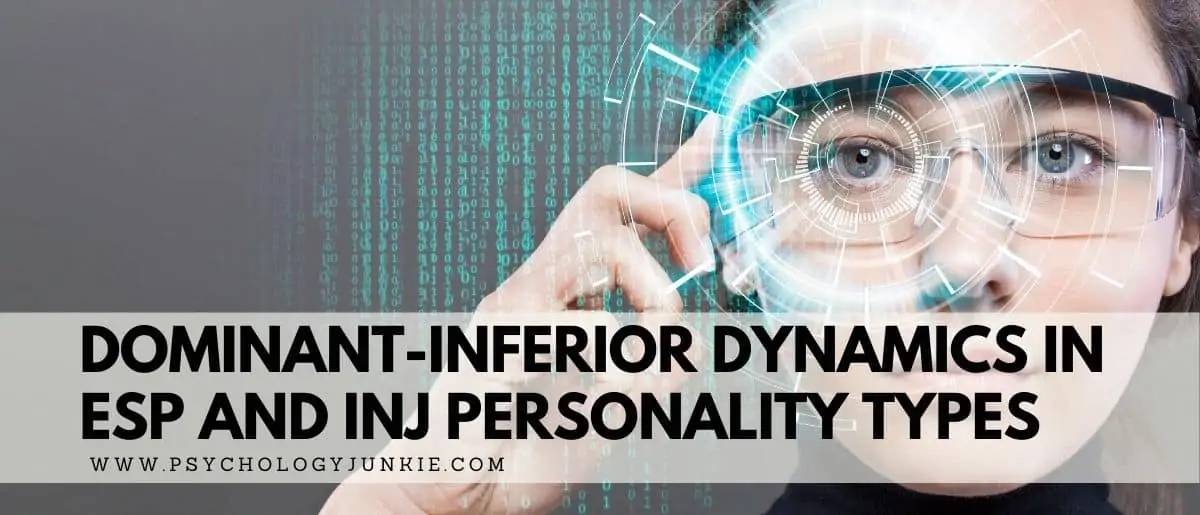Dominant-Inferior Dynamics in ESP and INJ Personality Types
Today we’re going to explore the unique interrelationship between the dominant and inferior function in the ESXP and INXJ personality types! ESTPs and ESFPs have dominant Extraverted Sensation with inferior Introverted Intuition, while INFJs and INTJs have dominant Introverted Intuition with inferior Extraverted Sensation. What is the nature of this relationship? How do the two functions work together? How can you strengthen you relationship with your inferior function? These are all things we’re going to be exploring today!
In today’s article, we’re going to be describing the dominant and inferior functions like a favored older brother and an annoying younger sibling. This helps us to understand how we value the functions; one is favored and valued while the other is often dismissed. Yet they both need each other and can learn great wisdom from each other. Let’s begin

Table of contents
Estimated reading time: 9 minutes
ESFPs and ESTPs – Extraverted Sensation (Se) and Introverted Intuition (Ni)
If Extraverted Senation (Se) is in the dominant position, its observations are prioritized and valued. This means facts, real-life experiences, and incoming, raw data is given the most credence in life and in decisions. ESxPs pride themselves on being realistic, matter-of-fact, practical, and ready for anything. They never want to be caught with their “head in the clouds” or lost in some imaginary daydream when real life is waiting. Extraverted Sensation is like the excited older brother that everyone in the ego appreciates and admires. He’s quick on his feet, clever about facts, full of good humor, and swift to act practically in a crisis.
Introverted Intuition, in contrast, is akin to the least-favored younger sibling. This function lurks in the background of the family, offering up insights and predictions which are usually pushed aside by Se. In many ways, Se dismisses Ni, laughing with the rest of the family at Ni’s “unrealistic” fantasies or “silly” premonitions. “Get with the program!” Se says to Ni, making a silly face at him, “Focus on the facts! Pay attention to what’s happening around you!”
A Glimpse at Extraverted Sensation:
- Gathers concrete details in the moment
- Focuses on data derived from the five senses
- Quickly notices, and respects, objective facts
- Focuses primarily on what’s relevant at the moment
- Seeks full immersion in the sensory world
- Responds rapidly to incoming, tangible data (a phone ringing, a ball being thrown)
- Is interested in tangible things
- Focuses on staying grounded, realistic, and observant
- Wants to live life to the fullest, wants to “Seize the day!”
But What Does Ni Bring to the ESxP?
Ni is the function that reminds the ESxP about the world beyond the senses. “What are you missing?” it calls out to Se, looking at a situation and trying to peer beyond the surface-level details. It beckons the ESxP to slow down, think about tomorrow, think beyond the immediate experience and consider the big picture. Rather than racing down the road at full speed because it’s fun, immersive, and makes use of the senses, Ni urges, “You can’t see what’s beyond that curve. It will be a policeman or a pedestrian. Is this race really that important? At the end of all things, will this moment really matter?” It’s the voice that says, “That person said one thing, but their body language said another. Trust your instincts. You know they’re lying.” Se quiets down, pauses, and realizes that the quiet younger sibling has wisdom and value even if he is such a slow, mirthless creature. When Se and Ni work together and respect each other, true magic can happen. The ESxP becomes more practical because they’re taking in relevant concrete data as well as insights about the future.
Ni can give the ESxP an interest in the profound and philosophical; inspiring them towards meaningful activities, causing them to look for depth of insight rather than breadth of experience, and giving them a sense of how things will unfold over time.
The impressions of Introverted Intuition are always very individual to the person. And because in ESxPs Ni is inferior, it often has a mystical quality to it. It can also be far off the mark sometimes, tripping up the ESxP, especially during times of stress. When Se gets exhausted from being “the favorite,” he may toss the keys to Ni and say “you got this now. I’m gonna go take a nap.” Ni, breathless at this chance to finally have authority, tries to make the ESxP aware of all the insights, visions, and meanings that have been going unnoticed for so long. However, because Ni is out of practice taking charge, and because Se is effectively asleep, Ni ends up making a mess of things, creating gloomy visions of the future, unrealistic premonitions about people, and a feeling of paranoia more than a feeling of profound meaning.
Se and Ni need each other, both in ESxP personality types and INxJ personality types. One working completely without the other is a recipe for disaster.
Ways for ESFPs and ESTPs to Tap into Ni (without getting exhausted):
- Imagine your life without limits and roadblocks. What would that life look like? Write down ways you could make that life closer to reality and ways you could attain that life.
- Spend some time each day in a quiet place (make sure your phone is turned off). Let yourself be “bored.” Let your mind wander without direction or limits. What do you imagine? Do you get any insights that you can apply to your life?
- Next time you’re listening to someone tell a story, ask yourself, “Why are they telling this story? What are their underlying motives?”
INFJs and INTJs – Introverted Intuition (Ni) and Extraverted Sensation (Se)
If Introverted Intuition (Ni) is in the dominant position, its insights and information are valued and given precedence. This means insights, underlying meanings, patterns, symbols, and visions are treasured and explored thoroughly. INxJs are often visionary, perceptive, intuitive, and philosophical. They focus not on what *exists*, but what *will exist.* They strive to see the ripple effects of everything that’s happening in the moment in order to predict the future as well as infuse meaning into otherwise shallow activities. You could imagine Introverted Intuition like the sage older brother, revered by the ego, given space and respect to divine meanings and possibilities.
Extraverted Sensation, in contrast, is akin to the boisterous, distracting younger sibling. He disrupts Ni’s reverie with a bunch of sensory facts and immersion. “Hey, big brother! Listen to this song! Do you hear that electric guitar?! Wow!” Meanwhile, Ni plugs his ears irritably, gives his younger brother a death glare, and pushes Se out of the house. “Go make that racket somewhere else! I’m trying to think!” Se trudges away sadly, irritated at constantly being dismissed or devalued.
A Glimpse at Dominant Introverted Intuition:
- Can see the shape of potential futures, unrestricted by time or concrete data
- Guides strategic planning
- Grasps the whole context of a situation in a flash of insight
- Looks for the underlying meaning behind things
- Seeks to develop a deeper level of understanding
- Applies metaphors and symbols to explanations
- Asks “What else is going on here?”
- Looks for patterns, trends, and interrelationships
But What Does Se Bring to the INFJ or INTJ?
Se balances Ni by bringing up relevant facts, details, and experiences. It grabs Ni by the shoulder and says, “I know you have a hunch that your sister-in-law is cheating on your brother, but have you considered that she has four children, a full-time job, and is tending to a sick father-in-law? Where would she find the time?” Se, so readily dismissed, keeps Ni from going off the rails and predicting and imagining things that have no basis in reality. It fills in Ni’s predictions with real, tangible observations and facts so that Ni isn’t making a bunch of insights that are completely unrealistic. So as much as Ni might think itself better and wiser, it is reliant on Se as much as Se is reliant on Ni.
That said, Se is still inferior for the INxJ, and therefore has a childlike, immature quality to it. It can trip up Ni, especially during moments of stress. When Ni has been completely overwhelmed or unable to solve an ongoing problem, he effectively shuts himself in his room and takes a long nap. He leaves Se a note that says, “You’ve got this. I’m too tired.” Se, thrilled to finally be given control of the psyche, tries to live it up as much as possible! He grab’s Ni’s credit card and blows $500 on snacks, drinks, dinner reservations, and a whitewater rafting adventure. He impulsively tells off the INxJs spouse for all the annoying things that have been bothering him for some time – damn the consequences! He drives down the road 40 miles over the speed limit, blasting Metallica, and enjoying his newfound freedom.
This lends itself to a stressed INxJ becoming reckless and impulsive, obsessed with sensory immersion and pleasure. They may eat too much, drink too much, impulsively blurt out uncouth thoughts, or spend an excessive amount of money. INxJs who have learned to tame their Se during stress channel it into healthier activities like exercising, cleaning, listening to music, going to the movies, or any other number of healthy activities.
Ways for INFJs and INTJs to Tap into Se (Without Getting Overwhelmed!):
- Practice tuning into your senses. Chew your food more slowly, savoring each flavor and texture. Listen to music and pay attention to the sound rather than the meaning of the words. Look around you and see which things excite your senses – engage with those things in some way.
- When you’re around friends or family members, attempt to stay tuned into the “here-and-now” as much as you can. Actively listen, try taking things at face value, and appreciate the details of the moment you’re living in.
- Find a recreational activity that you enjoy (even if you’re not especially good at it). Try making it a routine to practice it at least once a week. Practice becoming “one” with your environment as you do so. Let yourself fully inhabit your body and respond to the world around you. Go easy on yourself if you struggle initially or seem clumsier than you want!
What Are Your Thoughts?
Do you have any insights or advice to share? Let us and other readers know in the comments!
Find out more about your personality type in our eBooks, Discovering You: Unlocking the Power of Personality Type, The INFJ – Understanding the Mystic, and The INFP – Understanding the Dreamer. You can also connect with me via Facebook, Instagram, or Twitter!
Other Articles You Might Enjoy:
The Unique Intelligence of INFJs, INTJs, ENFJs, and ENTJs
The Unique Intelligence of ESFPs, ESTPs, ISFPs, and ISTPs
Extroverted Cognitive Functions versus Introverted Cognitive Functions















Super helpful! My little sister is Se dominant (ESTP) and I’m Ni dominant (INFJ). Reading this helps me understand her better. I like to keep a small fidget toy in my pocket to satisfy my Se when I’m stressed.
Thank you, Susan. The information you provide along with your great insights into type psychology are very helpful to me. They help me understand myself as a very much minority type and see why I’ve always had trouble and difficulty all of my life in fitting in to the prevailing types of our society.
Thanks to you as well as David Kiersey and Myers and Briggs I’ve learned to accept myself as an INTJ and not beat myself up so much for being an “odd-ball and an outlier.
Thank you. You do a great service.